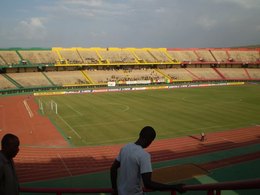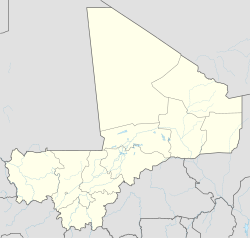You can help expand this article with text translated from the corresponding article in French. (March 2017)Click [show] for important translation instructions.
|
 | |
| Full name | Stade du 26 mars |
|---|---|
| Location | RN6 (Route Nationale 6) Bamako, Mali |
| Coordinates | 12°36′16″N7°55′18″W / 12.60444°N 7.92167°W |
| Owner | Malian Government |
| Capacity | 50,000 [1] [2] [3] |
| Surface | Grass |
| Construction | |
| Opened | December 31, 2001 |
| Construction cost | 30 million Euros |
| Main contractors | China Overseas Engineering Group |
| Tenants | |
| Mali national football team AS Onze Créateurs de Niaréla AS Police de Bamako CO Bamako Djoliba AC Stade Malien USC Kita Elewidj FC | |
Stade du 26 Mars is located in the southern neighborhoods of Bamako, Mali. It serves as a home ground for domestic football club Stade Malien and is the national stadium. It has a capacity of 50,000 as an all-seater stadium. Built in 2001, it is named for the date of Martyrs' Day, a national commemoration of 26 March 1991 Bamako uprising which overthrew the dictatorship of Moussa Traoré. [4] The stadium, which is built by China Overseas Engineering Group, [5] served as a venue for 2002 African Cup of Nations. [6]
